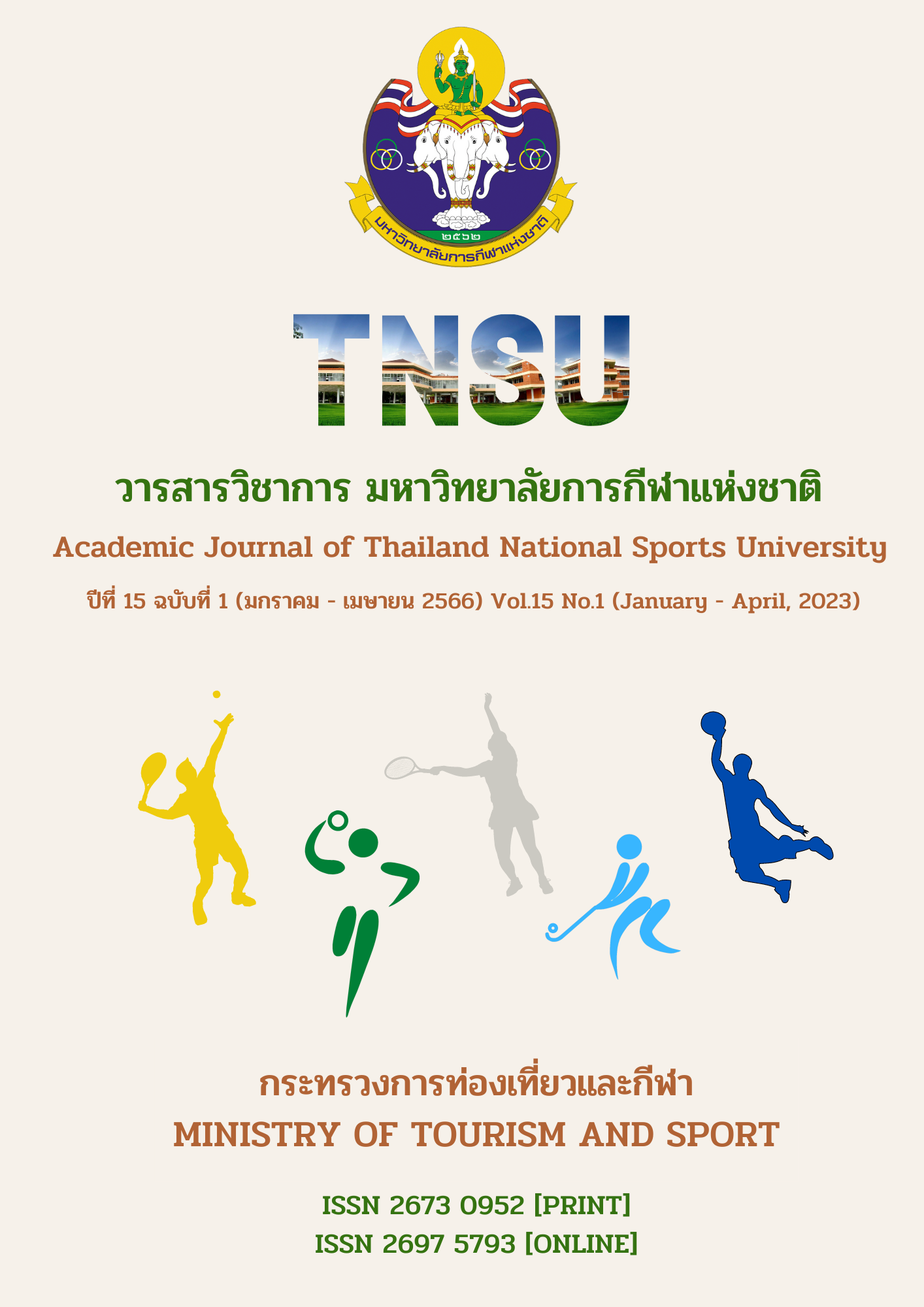A DEVELOPMENT ONLINE LEARNING MODEL BASED ON STEM EDUCATION TO ENHANCE CREATIVE THINKING FOR UNDERGRADUATE STUDENTS IN INSTITUTE OF PHYSICAL EDUCATION
Main Article Content
Abstract
The research, therefore, aimed to (1) Development online Learning Model Based on STEM Education to Enhance Creative Thinking for Undergraduate Students in the Institute of Physical Education and (2) to study the results of implementing the instructional activities developed with the sample of undergraduate students at the Institute of Physical Education.
The sample group was 30 undergraduates who enrolled for 6 weeks, 3 hours each, in the second semester of the academic year 2017, majoring in Exercise Science, and the sample of the undergraduates were selected by simple random sampling method from the total population of 30 in the institute of physical education Mahasarakham campus. All students took the course for the first time. Research instruments included (1) the developed online Learning Model Based on STEM Education instructional activity, (1) Learning Management System (LMS), (2) the learning achievement test, (3) the creative thinking test, (5) Behavior Observation form for lecturer. The collected data were analyzed using percentage, mean, standard deviation; and the dependent t - test was employed.
The findings showed that: there are four components in the model of STEM Education online learning namely (1) principles, (2) objectives, (3) procedures and instructional activities, and (4) measurement and evaluation. The instructional processes are divided into 3 phases, namely, (1) preparation, (2) online learning management, and (3) measurement and evaluation. The experts assessed the developed model at the most appropriate level. The experimental group of students showed gains in learning achievement and creative thinking as a whole and in each subscale from before learning with the developed model at the .01 level of significance, the students showed their opinions about Refection learning with the developed model at the appropriate level.
Article Details

This work is licensed under a Creative Commons Attribution-NonCommercial-NoDerivatives 4.0 International License.
The published article is a copyright of the Academic Journal of Thailand National Sports University. The passage appeared in each article in this academic journal is a perspective of each author which is not related to the journal. Each author is required to be responsible for all components of his/her own article. If there are any mistakes, each author must be responsible for those mistakes on his/her own.
References
Alena, D. M., Marina, V. R., Mikhail, V. V., Aleksander, A. O., & Natalia, V. L. (2020). Development of creativity of students in higher educational institutions: Assessment of students and experts. Universal Journal of Educational Research, 8(1), 8 – 16.
doi: 10.13189/ujer.2020.080102.
Chaiyot Ruangsuwan. (2005). Computer Instruction Development (9thed.). Mahasarakham: Faculty of Education, Mahasarakham University.
Gerard, J. P., & Lohiser, A. (2020). The case for creativity in higher education: Preparing students for life and work in the 21st century. Kindai Management Review, 8, 30 - 47.
Goodman, R. I., Flether, K. A., & Schneider, E. W. (1980). The effectiveness index as comparative measure in media product evaluation. Education Technology, 20(9), 30 - 34.
Heard, J., Scoular, C., Duckworth, D., Ramalingam, D., & Teo, I. (2020). Critical thinking: Skill development framework. Retrieved from https://research.acer.edu.au/cgi/ viewcontent.cgi?article=1042&context=ar_misc
Institute for Management Development (IMD). (2020). MD world competitiveness ranking 2020 factors ranking. Retrieved from https://www.imd.org/globalassets/wcc/docs/ 2020/wcc-site/wcy2020_overall_factors_5years.pdf
Intira phrompan. (2007). A development of a web - based instructional model based on brain - based learning process in design course to enhance creative thinking of undergraduate students (Doctoral dissertation), Chulalongkorn University.
Iskandar, D. Sastradika, Jumadi, Pujianto, & Denny Defrianti. (2019). Development of creative thinking skills through STEM-based instruction in senior high school student. 6th International Conference on Mathematics, Science, and education (ICMSE 2019) 9 - 10 October 2019, (pp.1 - 6). https://doi.org/10.1088/1742-6596/1567/4/042043.
Luan Saiyod, & Angkana Saiyot. (1995). Research Techniques in Education (4th ed.). Bangkok: Suriyasarn Press.
Ministry of Education. (2010). National Education Act (No.3) B.E.2553 (2010). Government Gazette, Vol. 116, Part 45 a, Page 1.
Montri Chulavatnatol. (2013). STEM education Thailand and STEM ambassadors. Retrieved from http://physics.ipst.ac.th/wp-content/uploads/sites/2/2014/11/STEMEdu_IPST Mag185.pdf
Porntip siripatrachai. (2013). STEM education and 21st century skills development. Executive Journal, 33(2), 49 - 56.
Prasart Nuangchalerm. (2011). Teaching and Learning Research. Mahasarakham: Apichat printing Press.
Raksapol Tananuwong. (2013). Learn about global warming with integrated STEM Education. IPST magazine, 41(182), 15 – 20.
Schachter, R. (2012). A classroom of engineering: Teaching STEM in the younger grades. Scholastic Instructor Magazine Spring 2012, 43 - 47.
Scott, C. (2012). An investigation of science, technology, engineering and mathematics (STEM) focused high school in the U.S. Journal of STEM Education, 13(5), 30 – 39.
Sirinapa Kitkuakun. (2015). STEM education. Journal of Education Naresuan University, 17(2), April – June, 201 - 207.
Sumalee Chaijaroen. (2014). Instructional Design: Theory in to Practice. KhonKaen: Penprinting.
Torrance, Palue E. (1968). Torrance tests of creative thinking. Princeton, N.J.: Personnel Press.
Tseng, K., Chang, C., Lou, S., & Chen, W. (2013). Attitudes toward science, technology, engineering and mathematics (STEM) in a project – based learning (PBL) environment. International Journal of Science and Mathematics Education, 23, 87 - 102.
Uthit Bamroongcheep, (2008). The web - based instruction model using the constructionism for creative thinking development (Doctoral dissertation), Kasetsart University.
Vygotsky, L. S. (1978). Mind in Society: The Development of Higher Psychological Processes. Cambridge, MA: Harvard University Press.
Wichai Wongyai, & Marut Patphol. (2021). Developing creativity in students. graduate school Srinakharinwirot University. Retrieved from http://www.curriculumandlearning.com/ upload/Books/Develop%20Creativity_1615683966.pdf


